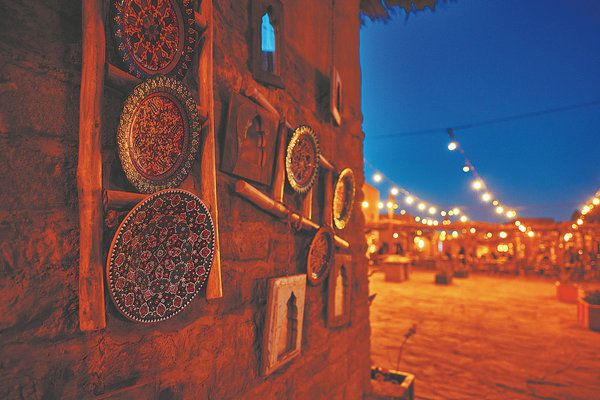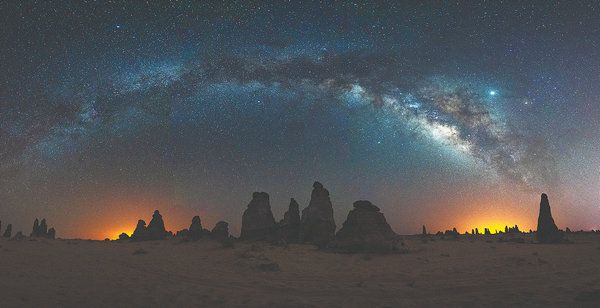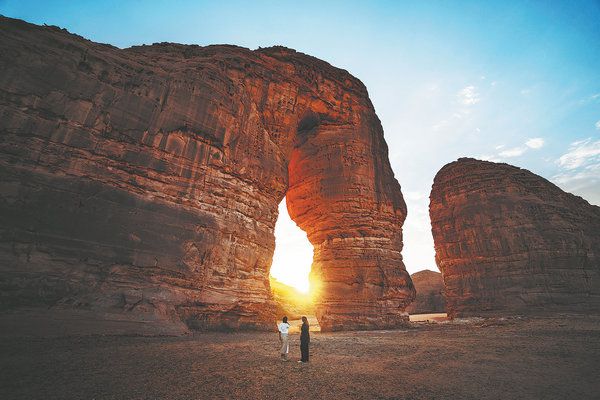
One of AlUla's must-visit areas is Hegra, Saudi Arabia's first UNESCO World Heritage Site, home to monumental Nabataean rock-cut tombs with ornate facades decorated with epigraphs. [Photo / China Daily]
The lush oasis valley seems strangely at odds with the common perception of Saudi Arabia. Make no mistake, the desert is here, but so too are enchanting vistas. Over millions of years, sun, wind and water have shaped the sandstone around here into striking rock formations. This is a landscape where the imagination can run free. Even the area's spelling is unusual and enchanting — AlUla. This part of northwestern Saudi Arabia was once home to powerful ancient kingdoms and civilizations.
It was a key stopping point on the Incense Route, which linked southern Arabia to the Mediterranean, and also a point along the branch of the Silk Road that extended into the Arabian Peninsula. Around 1000 BC, AlUla emerged as a hub for the camel caravans transporting spices and aromatics across the deserts.
Commerce, art, languages and ideas have been evolving in the region, making it an ideal destination for cultural and historical sites. In AlUla, besides the ancient city of Dadan, tourists can visit Hegra, Saudi Arabia's first UNESCO World Heritage Site, and home to monumental Nabataean rock-cut tombs with ornate facades decorated with epigraphs.
"In AlUla, our Chinese customers, ranging in age from their 20s to 70s, consist of a diverse group including both young travelers and retirees seeking new adventures," says Zhou Dongni, managing director of Talia Travel and Tourism agency, based in Riyadh, Saudi Arabia. "They like to enjoy authentic Arabian cuisine, luxury accommodation and the blend of modern and tradition."

AlUla, Saudi Arabia, was once home to powerful ancient kingdoms and civilizations. It's now a popular destination where tourists can experience local culture, enjoy stargazing under clear skies and visit heritage sites. [Photo / China Daily]
She adds that while promoting Saudi Arabia in the Chinese market, it's important to ensure that tourists are aware of the local traditions.
In 2023, AlUla welcomed 263,000 visitors, 3.1 percent from the Asia-Pacific region, including China. It aims to attract 292,000 tourists by the end of 2024 and 1.1 million by 2030 through intensified marketing, according to official data.
"While this percentage remains small compared to other regions, there is significant potential for growth," says Rami AlMoallim, vice-president of destination management and marketing at the Royal Commission for AlUla. He recently visited Beijing for the Saudi Tourism Festival, an official promotional event for the kingdom.
"The Chinese market is crucial. To boost tourism from China, we plan to ramp up marketing in the country."
The tourism authority of AlUla is working with local partners to strengthen its presence in China, including by participating in travel fairs and organizing promotional events.
AlMoallim has noticed that many Chinese visitors to AlUla are young couples, travel groups and solo travelers. They value culture and history, and delight in exploring cities with historical significance.
He says that AlUla targets affluent Chinese tourists by offering a blend of luxury and authentic cultural experiences.
"We're striving to create immersive experiences that connect visitors with AlUla's landscape, culture, history, art and outdoor adventure," AlMoallim says.

AlUla, Saudi Arabia, was once home to powerful ancient kingdoms and civilizations. It's now a popular destination where tourists can experience local culture, enjoy stargazing under clear skies and visit heritage sites. [Photo / China Daily]
Tourists can enjoy hot air balloon rides with a tour guide sharing the landscape's history from above, take a private tour to ancient heritage sites in a vintage vehicle, or enjoy stargazing under clear skies and learn how ancient Arabs used the stars for navigation, to name but a few activities.
"We've adopted a varied strategy, to meet the needs of Chinese tourists, that emphasizes cultural, historical and luxury experiences," he says.
The commission is promoting the destination on Chinese social media platforms, showcasing experiences, such as exploring ancient tombs and enjoying luxury desert stays, and is also teaming up with influencers, who showcase the beauty of AlUla through travel vlogs and livestreamed tours.
Last year, Divas Hit the Road, a popular Chinese traveling reality show based around celebrities, chose AlUla as one of its destinations, boosting its reputation as a luxury and cultural destination for local tourists.
Earlier this year, AlUla, Wonder of Arabia, an exhibition at the Palace Museum in Beijing, presented an overview of the area's history through 236 artifacts, attracting 275,000 visitors and industry professionals.

AlUla, Saudi Arabia, was once home to powerful ancient kingdoms and civilizations. It's now a popular destination where tourists can experience local culture, enjoy stargazing under clear skies and visit heritage sites. [Photo / China Daily]
"It's a pivotal step to promote the region's key heritage sites to Chinese tourists, sparking cultural curiosity among them," says Abdulrahman AlSuhaibani, vice-president of culture at the Royal Commission for AlUla, and the curator of the exhibition.
"With over 30,000 archaeological sites in AlUla, being in the region feels like living in an open museum," AlSuhaibani says. He stresses that AlUla is dedicated to making its cultural offerings available to a diverse audience and says that they have put more efforts into enhancing the experience for Chinese visitors, while preserving the region's rich cultural heritage.
"We're actively balancing tourism with the preservation of its cultural heritage through strategic partnerships and sustainable tourism practices," he says. "For example, we've worked with Chinese museums to focus on areas like archaeology, cultural heritage preservation and research."
AlUla's tourism authority offers Chinese audio guides and is hiring Chinese-speaking tour guides to help visitors understand the stories behind its heritage sites.
Moreover, it's also possible to pay through China UnionPay for greater convenience.
At the AlUla Language Institute, founded in 2021, Saudis can learn Chinese, among other languages, smoothing communication with tourists.
 Editor:Li Lulu
Editor:Li Lulu